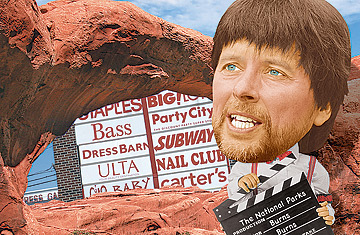
Ken Burns has a knack for making documentaries about some of the most contentious episodes in American history without saying anything that will tick anyone off. Over two decades, his PBS films have taken on the Civil War, feminism, World War II and, above all, race. They've been criticized for omissions: Hispanics in The War, modern artists in Jazz. But on the whole, they're substantive without being polarizing, passionately arguing positions almost everyone agrees with: Racism is bad, democracy is good, war is hell.
His latest, six-part PBS series — The National Parks: America's Best Idea, which debuts Sept. 27 — does not sound like an exception. Who's going to argue with a tree? And the opening minutes — luxuriating in dramatic shots of lava flows, stalactites and waterfalls — promise plenty of unobjectionable, pledge-drive-friendly nature porn. But in a way he couldn't have planned, Burns has ended up making his most topical and political film yet. With America frothing over the role of government — should it save banks? should it expand health coverage? — The National Parks makes a simple case for an idea that is wildly controversial in the year of the tea party: That we need government to do things the private sector can't or won't.
The miniseries starts in the mid — 19th century, when nature lovers began urging that the expanding nation set aside areas of wilderness to remain undeveloped and unspoiled. Their cautionary tale was Niagara Falls, which by the 1860s was "almost ruined" — overrun by hucksters and tourist traps, with nearly every good view privately owned. Unless the government acted, advocates like naturalist John Muir warned, Yosemite and Yellowstone would end up the same way. "To Europeans," reads narrator Peter Coyote, Niagara "was proof that the United States was still a backward, uncivilized nation."
Government intervention! Private-sector-bashing! Americans trying to impress Europeans! These and other pinko motivations would secure a permanent federal handout for Yogi Bear and his picnic-basket-redistributing comrades. You can imagine how the proposal might go down were the parks starting from scratch today. Socialized nature, controlled by tree czars?
And in the decades that followed, there were battles — with drillers, ranchers, developers — over and over (and over: The National Parks is gorgeous, but at 12 hours, it sometimes gives new meaning to the term geologic time). When FDR created Jackson Hole National Monument in 1943, a Wyoming Senator likened the plan to Pearl Harbor, while a local journalist compared it to Hitler's Anschluss.
Burns and writer Dayton Duncan make plain which side they're on. (The subtitle is a hint.) A section on the battle to create a park in the Smoky Mountains contrasts schoolkids collecting pennies for the effort with logging companies bankrolling ads and "frantically cutting the old-growth forests ... to extract everything they could before the land was closed to them." Speaking to critics this summer, Burns said, "If there were no national parks, [the Grand Canyon] would be a gated community."
The national parks — and The National Parks — are based on ideas that are classically, if not radically, communitarian: That the free market doesn't always act in the public interest. That it's good that every American shares ownership of and responsibility for the most exclusive properties in the country. And that it is right for people — through government — to protect them from business interests and even from the people themselves (like the early visitors who shot game and scratched their names on ancient rocks). A series on a public-TV network that calls a government program America's best idea? Has no one alerted Rush Limbaugh?
Yet The National Parks seems unlikely to cause an outcry. Parks are not as costly as a bank bailout or as angst-inducing as health care, and who wants to be the one to throw a spitball at Old Faithful? The documentary cannily stops at 1980, avoiding the Ronald Reagan — James Watt era as well as today's drill-here, drill-now controversies. It helps too that one of the parks' most vigorous progressive advocates was a Republican — President Teddy Roosevelt.
But maybe it would be better if people were arguing over The National Parks. The film is an overstuffed love letter to America that tries — as the parks' architects also did — to unite people in connection with the heartbreakingly gorgeous land they share. Lyricists write about purple mountains' majesty for a reason: these vistas inspire introspection and humility. Maybe this film could do what town halls and presidential addresses haven't done — encourage us to debate what our country should be, and what makes America beautiful, without getting ugly.
